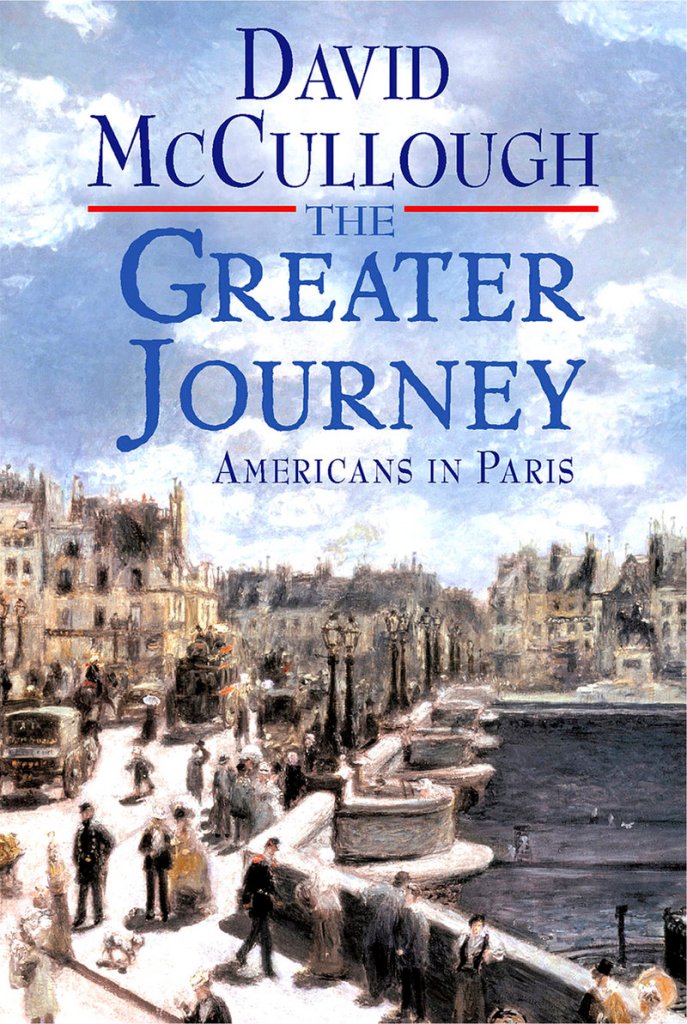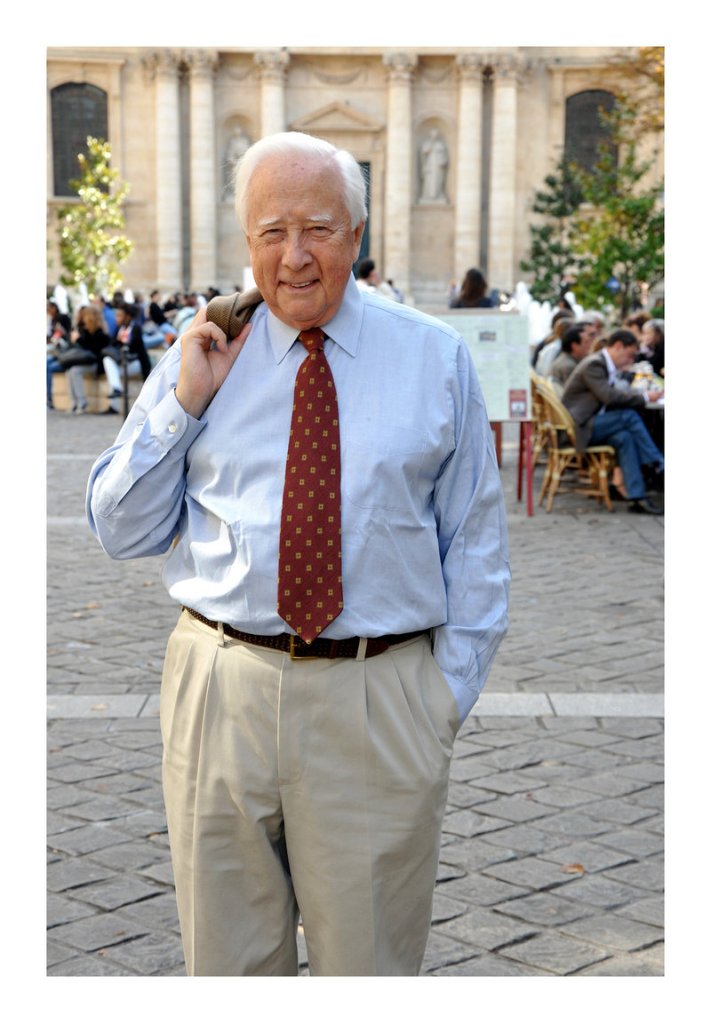David McCullough has a knack for taking historic events and figures — the kind often presented dryly to us in school — and turning them into best-selling books.
His “John Adams” was one of the most critically acclaimed American biographies of all time, and became the basis for an HBO film. His “1776” was No. 1 on both the hardcover and paperback New York Times best-seller lists. Other books he’s written, including “The Great Bridge,” “The Johnstown Flood” and “Truman,” have helped make him one of America’s best-known historians.
But McCullough, who splits his time between homes in Camden and Massachusetts, says he’s probably never enjoyed working on a book more than with his most recent work, “The Greater Journey: Americans in Paris” (Simon & Schuster, $37.50).
The book is a compilation of stories about Americans who had watershed moments in Paris between circa 1830 and 1900. The book explores how these Americans went to Paris to study art, science, medicine, architecture, politics and other fields in ways that were not available to them here, and how the knowledge and experience they brought back helped change America immeasurably.
The fun part, McCullough says, was that he got to “cast” the book, because he chose which stories to flesh out.
“With other subjects I’ve written about, it’s pretty straight on. There’s a cast of characters involved, there’s a lineup,” said McCullough, 77. “But in this one, I got to pick. I had to choose. I couldn’t possibly write about every American who went to Paris. It wouldn’t be a book, it would be a catalog.”
One of the chapters in his new book explores the story of Elihu Washburne, who was born on a farm in Livermore (now the site of the Washburn-Norlands Living History Center) and went on to be a congressman from Illinois and ambassador to France. At a time when other diplomats had fled, Washburne stayed in Paris during a long siege that was part of a Franco-Prussian war in 1870. He was credited with helping thousands of people — including Germans — get safely out of the city.
Q: Why did you choose to write about Elihu Washburne, and where did you find your information?
A: It’s a great story, and we were very fortunate to find his diary. Copies were in the Library of Congress, but the pages were all bound in a book with letters. My research assistant, Mike Hill, figured out that they weren’t letters, they were part of a diary. That lead us to (Norlands), where we found more.
Washburne and his siblings (including other congressmen) credited their mother, who was by all accounts a remarkable woman. When asked why so many of her children left Maine, she said there was not one state big enough to hold them.
Washburne is remarkable not only because he stayed in Paris, but because he did so much good. He arranged for (more than) 20,000 German laborers to get out, as well as Americans. If he had only done that, it would have been a heroic performance. But because he kept a diary every single day, and wrote very thoughtful essays on the events he was seeing firsthand, he provided an account for the world that is incomparable. I know of no French account that is comparable. He felt it was his duty to do this.
Part of the story is the irony and shock that this city, this essence of civilization, could self-destruct the way it did, first with the siege, then with Frenchmen killing Frenchmen. So the fact that Washburne stayed is truly remarkable.
Q: Was there something unique to Paris that inspired Washburne to do what he did? Or that inspired the other Americans in your book?
A: Washburne loved Paris. His wife spoke French, so he learned to speak it, and it was spoken in his home. He loved opera, and his opera cape is in the collection at Livermore. He was a well-read, observant man, and I think Paris stimulates one to feel intellectual, to feel that anyone could be or should be interested in all of it — art, music, science, architecture.
Q: How did you choose the book’s parameters — Americans in Paris between 1830 and 1900?
A: I had been very interested in Americans in Paris for years. In college, I had read a lot about Americans there in the 1920s and ’30s. But here was this period about which scarcely anything had been done. All these people had been drawn to Paris by the chance to learn and study under top people, in medicine, in art, in literature, and by the general energy of a cultural center.
I hope the book is a portrait of the development of our own country. In the 1830s, medicine in this country was primitive. Many doctors hadn’t been to medical school, it was illegal to use cadavers for medical study, and most American women at that time would have preferred to die rather than having a man examine them. And because most doctors were men, a lot of women did die. Where in Paris there was no such stigma, and Americans could study for free.
There were also, at that time, no art schools, no art museums, no architecture schools in this country. So when (Americans) got to Paris, it was all there for them. It was a thrilling time for them, though they weren’t there to have a good time. They worked harder than they ever had.
Q: Where does this book rank in terms of difficulty, compared to others you’ve done?
A: I’ve learned more about the whole realm of human achievement with this book. I enjoyed it more than any other, because I had the privilege of casting it. Most people never heard of some of the people I chose to write about, such as the sculptor Augustus Saint-Gaudens, or George Healy (a portrait painter), or Elizabeth Blackwell, the first American woman to become a physician. All these are stories of courage — the courage to do something unprecedented. Imagine as a young medical student, you can’t speak a word of French, but you find a way to do it and complete your studies.
Q: Do you still do narration work for documentaries and films? Do you like that work?
A: I haven’t done much since the film “Seabiscuit” (2003). I’ve had my head down in this book for the past four years. I do enjoy doing it. It’s completely different, very hard work. You stand in a sound booth, sealed off, with producers on the other side of the glass. And you have to do it in time with the film. The great pleasure of that work is the people I’ve been able to work with, like David Grubin or Ken Burns. People think that a writer’s life is solitary, and certainly a lot it is, but I deal with a lot of other people — archivists, experts on a given subject, other historians or biographers. So a big part of the joy of all my work is the people I get to meet.
Q: How did you come to have a home in Camden?
A: We spend a lot of time in Camden (he also has homes in Boston and on Martha’s Vineyard), and we love it. We’ve been there more than 10 years now. Our daughter and four of our grandchildren live there, and grandchildren are a very big pull.
Staff Writer Ray Routhier can be contacted at 791-6454 or at:
rrouthier@pressherald.com
Send questions/comments to the editors.





Success. Please wait for the page to reload. If the page does not reload within 5 seconds, please refresh the page.
Enter your email and password to access comments.
Hi, to comment on stories you must . This profile is in addition to your subscription and website login.
Already have a commenting profile? .
Invalid username/password.
Please check your email to confirm and complete your registration.
Only subscribers are eligible to post comments. Please subscribe or login first for digital access. Here’s why.
Use the form below to reset your password. When you've submitted your account email, we will send an email with a reset code.